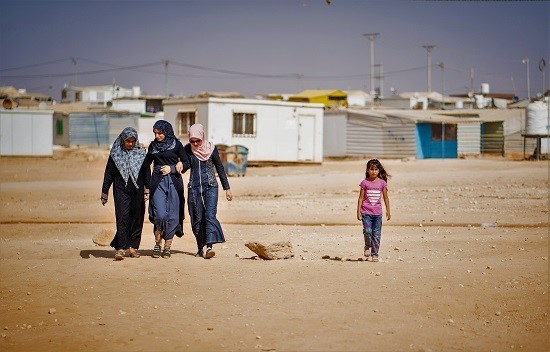The overwhelming sympathy toward refugees who fled
persecution or for economic reasons remains very high among Jordanians.
However, when these sympathies are examined against economic rationality, they
tend to change in degree, not type.
اضافة اعلان
 Three Syrian refugee women and a girl enter the Oasis Center for Resilience and Empowerment of Women and Girls operated by UN Women in the Zaatari refugee camp in Jordan. (Photo: Flickr)
Three Syrian refugee women and a girl enter the Oasis Center for Resilience and Empowerment of Women and Girls operated by UN Women in the Zaatari refugee camp in Jordan. (Photo: Flickr)
A survey published jointly by UNHCR and NAMA Strategic
Intelligence Solutions last week shows that over 90 percent of Jordanians are
“sympathetic toward people who come to Jordan to escape conflict and
persecution for reasons of race, religion, ethnicity, nationality, membership
in a particular social group, or political opinion”. This level of sympathy
decreases in a statistically significant manner, although it remains above 80
percent when the reason for seeking “refuge” is economic.
The further we examine attitudes, the more apparent economic
conditions surface as a major driver of change in attitudes.
What determines acceptance or rejection of refugees and
immigrants? Does it differ from one society to another? Immigration research
provides many determinants of attitudes toward refugees and these determinants
do differ from one society to another. Some societies base their position on
whether they need the services of the refugees or immigrants – economic
determinants, while others factor cultural affinity, language, religion and
education of the asylum seekers in the process of accepting or rejecting them.
When comparing Jordanian attitudes to those of European
societies, we uncover interesting patterns.
In comparative terms, a recent study by the immigration lab
of Zurich and Stanford, titled “Decoding European attitudes toward refugees”,
which analyses data from 18,000 Europeans in 15 countries on “how economic,
humanitarian, and religious concerns shape European attitudes toward asylum
seekers”, concluded that “among those most likely to win acceptance were asylum
seekers with professional skills and proficiency in the host country’s language
— those who are expected to benefit rather than burden the local economy”.
The study finds that if an asylum seeker is a doctor they are 11 percent more likely to be accepted than an unemployed person (base = 0), and
if the refugee is a Christian, they are 11 percent more likely to be accepted
than a Muslim (base = 0). The language of the host country, consistency of the
asylum narrative, and vulnerability show similar probabilities, where 0 means they are does not speak the host country language, there is inconsistent asylum
narrative, and the refugee is not vulnerable.
In a previous survey by Konrad Adenauer Stiftung and NAMA,
in December 2018, 84 percent of Jordanians described political relations
between Jordanians and Syrians as “very good or somewhat good”. A higher
percent of Syrians in Jordan (98 percent) described political relations in the
same way.
Although these attitudes reveal cultural affinity and
humanitarian sympathy, when the economic conditions of Jordanians are taken
into account, economic rationality begins to cause a shift in Jordanians’
perceptions of Syrian refugees to be less positive.
Although Jordanian hosts and Syrian refugees have stated
good grounds for these positions, both acknowledge the economic difficulties
linked to refugees, and which affect Jordanians, especially those at the lower
end of the economic scale.
In the KAS-NAMA 2018 survey, when Syrian refugees were asked
the open-ended question “taking all things into consideration, which country do
you think treats Syrian refugees best”, 78 percent of them named Jordan,
followed by Canada, at 6 percent, Turkey, 4 percent, and Germany, 2 percent.
Although this might be conditioned by the context, 92
percent of them responded “yes” to the question “do you consider it an
advantage being a refugee in an Arab country with a similar language and
culture”. Furthermore, when asked “if you were given a choice, which country
would you choose to go to as a refugee?” 56 percent chose Jordan, 19 percent
chose Canada, 4 percent chose the US, 3 percent chose Germany, and 2 percent
each chose Turkey, UK, and Sweden.
Moreover, when asked “to what extent have you felt welcomed
in Jordan”, 98 percent said they were welcomed. Also, 88 percent said they feel
more welcomed in Jordan than in Lebanon and Turkey. These declared attitudes
were mirrored by Jordanians.
On average, when Syrian refugees were asked to evaluate
their impact on a variety of issues in Jordan, including security,
infrastructure, water, education, health, labor market, government debt, the
economy, trust in public institutions, 15 percent reported they had a “positive”
impact, 25 percent said “negative”, 55 percent said no impact. An overwhelming
majority of them, 77 percent, said their presence in Jordan had a positive
impact on Jordan’s image internationally. While this is widely recognized by
Jordanians and others, it does not ease the economic pressure ordinary
Jordanians feel.
The perceivable change in Jordanian public opinion toward
refugees is demonstrated in the decrease by 12 points between October 2020 and
November 2021 of the percentage of Jordanians saying that “Jordanians’
perception of refugees” is positive. This decline can be explained by a body of
opinion, ranging from 94 percent agreeing to the statement “there are too many
refugees in Jordan”, to 81 percent agreeing to the statement “Jordan has done
more than it needs to support refugees”, to 69 percent agreeing to the
statement “Jordan should focus on helping Jordanian not refugees”, to 69
percent who agree to the statement that “refugees get more help than
Jordanians”.
These concerns of Jordanians should not go unnoticed by the
stakeholders. While even great communication tools and messages fail to change
realties, it is essential to combine Jordanians-oriented development
interventions with “proper” strategic communication effort to mitigate the
changes and preserve what remained of social cohesion.
The writer is chairman of NAMA Strategic Intelligence
Solutions
[email protected]
Read more Opinion and Analysis



